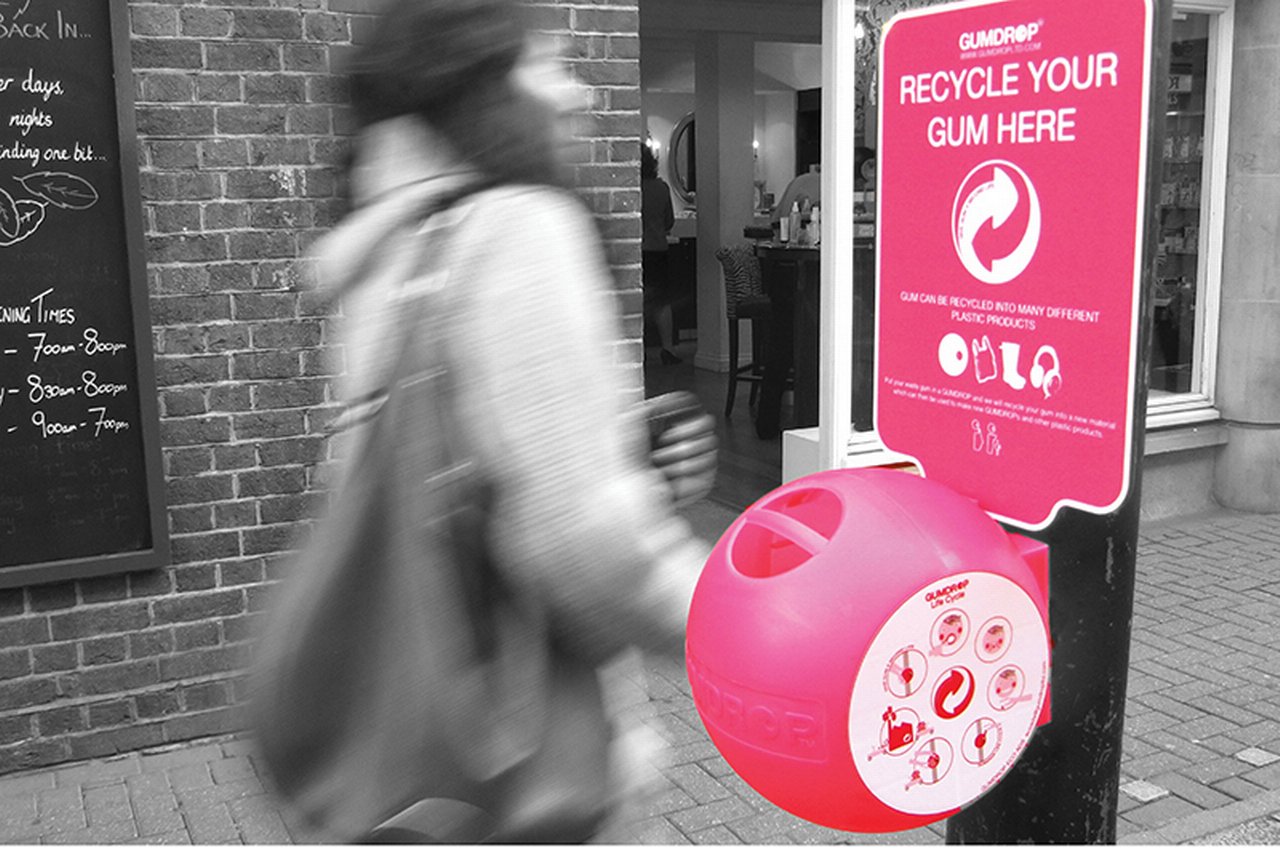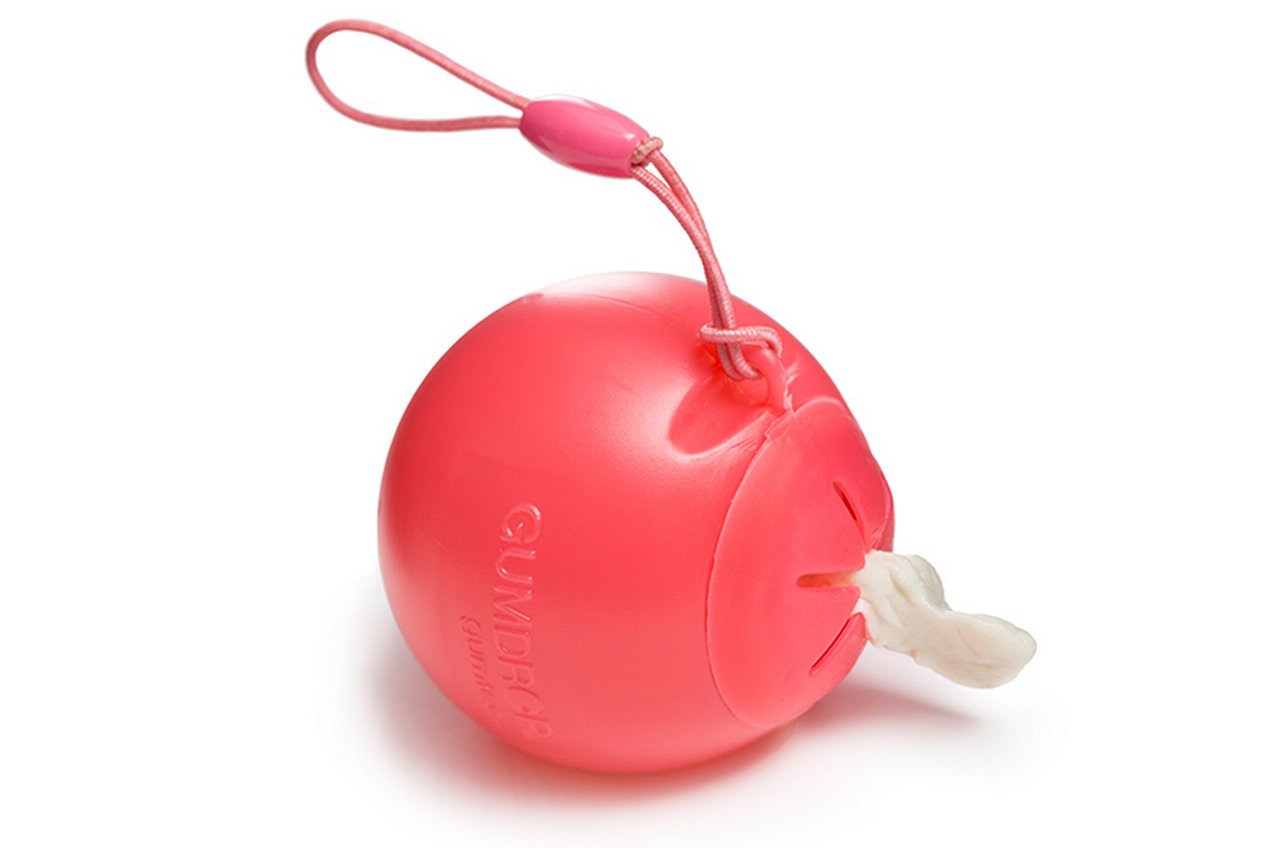June 2018
Cleaning chewing gum from the streets can be difficult and costly. flow’s Janet Du Chenne meets entrepreneur Anna Bullus, whose recycling company Gumdrop is determined to change that
MINUTES min read
The next time you stand in chewing gum, ask yourself: what if this could be turned into something useful before it becomes a nuisance? This question got entrepreneur Anna Bullus thinking and led her to set up Gumdrop Ltd, a company that recycles waste chewing gum and processes it into a range of new, sustainable compounds that can be used in the rubber and plastics industry.
Noting on its website that it costs £150m a year to remove chewing gum litter from streets in the UK (34,000 football pitches, for scale), Gumdrop makes round pink bins for collecting gum after it has been chewed. The full bins are collected and recycled, and the waste gum is turned into sustainable compounds, Gum-tec, using a closed-loop recycling process. Those compounds are used to produce an array of products, including Wellington boots, coffee cups and stationery products, that are sold on the company’s website. The products, which are 100% recyclable, along with the Gumdrop bins, can be put back into the recycling process and recycled again and again. Gum-tec compounds do not use virgin plastics, as well as reducing the amount of oil that is used in the actual plastics recycling process. “The process we use is a sustainable way of producing plastic compounds, as we are not using any new plastics or oil in the process. This helps to save our natural resources,” explains Bullus.
Using a sticky message
Gumdrop also works with chewing gum manufacturers, offering them a zero waste to landfill alternative using its closed loop recycling process. “The tide is changing, with the reduction of single use plastics now on the agenda. This is a great time for Gumdrop as the public, as well as manufacturers, are open to our solution and Gum-tec compounds as a more sustainable alternative for manufacturing,” reflects Bullus. She has therefore been able to gain sizable contracts for Gumdrop’s initiatives and campaigns. “It is a great solution for the gum industry, as it produces a huge amount of waste every year. Recycling is the best option for it to make its waste line more efficient.”

Gumdrop Bin
Public impetus was largely responsible for getting the chewing gum manufacturers on board with the concept. “Recycling and more responsible waste disposal has grown and there has never been a finer time for the industry, with consumers taking more responsibility,” says Bullus. “But there has been an absence of real front-end solutions saying ‘this is why we are providing a solution that focuses on the gum before it hits the ground’.” The message for the public is that Gumdrop provides an environmentally friendly way for people to dispose of their chewing gum. “A small change in habit (putting their gum into the Gumdrop bins) can open up people’s minds – and they will be more susceptible to changing other habits as well,” she predicts.

Anna Bullus, Gumdrop Ltd.
That change in habit creates a new source of material that can be used to manufacture new Gumdrop Bins and other products. According to Bullus, this means diverting a waste stream and using that to create products that can then be recycled repeatedly. “If you can do that with chewing gum, you can do it with all sorts of other waste streams,” she says. “People are very interested – having gone from saying ‘I never knew you could make something out of recycled chewing gum’ to actually using one of our products.”
Positive impact
This closed loop recycling process has also positively impacted other sustainable initiatives. For example, the Design Museum in London hosts education workshops and uses Gumdrop as an example of closed-loop design in materials and sustainable manufacturing. Bullus was invited to judge the Design Ventura 2017 Awards, in partnership with Deutsche Bank, as part of the bank’s youth engagement programme, ‘Born to be’. Each year, students are challenged to design a new product for the Design Museum shop in London.
Gumdrop has also teamed up with the Small Steps project, a charity that aims to get families and children off landfill sites in Romania. For every pair of Gumboots produced in the UK and sold, a pair is manufactured to go to children on the landfill sites in Romania to protect their feet from toxicity.
Stick with Gumdrop
The Gumdrop Bins are actively saving time and money for the companies that hold contracts with Gumdrop. For example, Heathrow Airport has 21 Gumdrop Bins and is saving more than £8,000 in cleaning costs every year. Anglia Ruskin University has 50 Gumdrop Bins over three of its campuses and is saving £18,000 a year on cleaning costs.

Gumdrop receptacle
In an age when so many sustainable efforts are embedded in people’s psyche and organisations’ corporate social responsibility programmes, this could not be a better time for pioneering companies like Gumdrop. For example, Deutsche Bank has sustainability offerings in its core business and is among the top European private-sector project financiers in clean and renewable energy, with approximately €2.2bn in project finance. It has also partnered with clients in several landmark issues in the fast-expanding green bond market and its asset management arm had €20bn of environmental, social and governance assets under management at the end of 2017.1
This growing commitment to a sustainable future presents Gumdrop with an opportunity to scale and grow. With its core business in the UK, Bullus is looking for partners and investors to expand both domestically and into overseas markets. “As well as R&D for applications in high-volume markets for Gum-tec,” says Bullus, “in the construction and the car industries, there are many applications that chewing gum would lend itself really nicely to, including car bumpers, car mats, construction and piping. In terms of volume and delivering sustainable options into those markets, the performance still has to be good quality, which chewing gum, bizarrely, provides. When you see it like this, it all comes together.”
The next time you get rid of your chewing gum, think of the potential of the Gumdrop bins and what this sustainable initiative can do for your business. Stick with them.
Contact Anna Bullus: anna@gumdropltd.com
Sources
1 See Deutsche Bank Annual Report 2017
Go to Corporate Bank EXPLORE MORE
Find out more about products and services
Go to Corporate Bank Go to Corporate BankStay up-to-date with
Sign-up flow newsbites
Choose your preferred banking topics and we will send you updated emails based on your selection
Sign-up Sign-upYou might be interested in
Community
Poetry in the park Poetry in the park
How did a member of Deutsche Bank’s operations team get to be appointed Poet in Residence at one of London’s iconic cemeteries? flow hears from Dave Brooks, better known to his readers as Nelson Brooks, about how his verses raised money for charity during the pandemic
Community
Street smart Street smart
With the pandemic bringing the challenge of ethnic disparities to the fore of the public agenda, flow finds out how content agency Word on the Curb – one of the Deutsche Bank Awards for Creative Entrepreneurs 2020 winners – is using video to help treat the symptoms and have a positive social impact
COMMUNITY {icon-book}
Ba[n]king trust Ba[n]king trust
flow’s Clarissa Dann reports on how a series of Deutsche Bank cooking events has helped to foster team togetherness amid the homeworking environment



